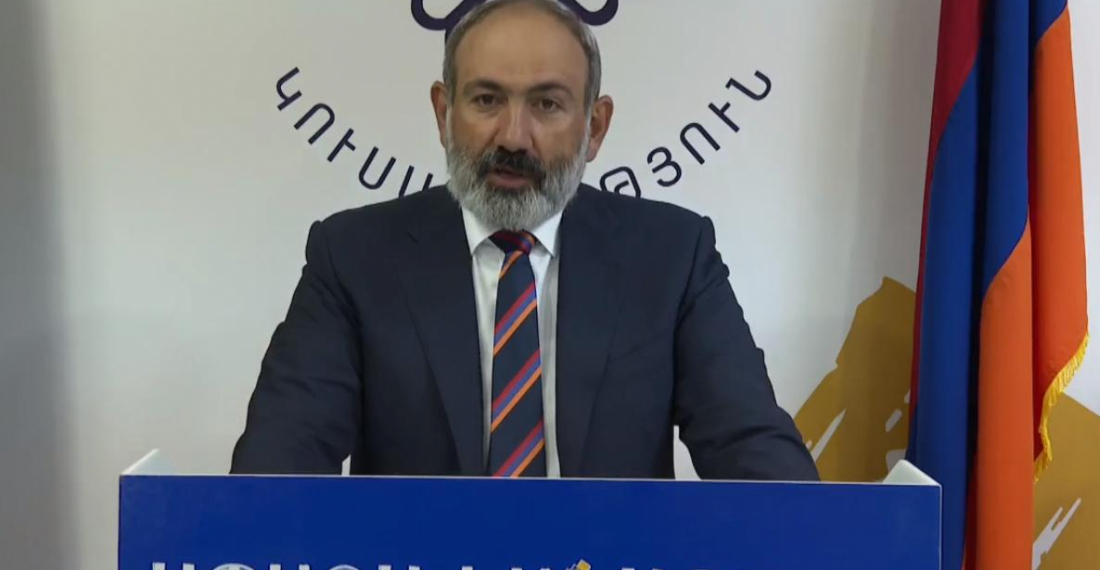– See commonspace.eu's live blog on the Armenian elections –
Armenia's parliamentary elections were properly conducted with only minor violations. But Nikol Pashinyan's landslide victory was somewhat surprising says Benyamin Poghosyan in this op-ed for commonspace.eu.
Early Parliamentary elections in Armenia are over. The ruling Civil Contract party received approximately 54 percent of vote, while its main opponent – the Armenia alliance, led by the second President of Armenia Robert Kocharyan – got 21 percent. No other party or alliance has overcome the threshold to enter the Parliament. However, according to the Armenian legislation, I have honor alliance will be represented in the legislative body, as the law requires to have a minimum of three parties in the Parliament.
The announced results are a bit surprising. Almost everyone in Armenia believed that incumbent prime minister, Nikol Pashinyan, would receive the largest number of votes. However, many experts argued that Civil Contract would get no more than 40 percent of the votes and Pashinyan would need to form a coalition to keep his position. There was an active debate in Armenia regarding the potential coalition partners for Nikol Pashinyan, and the primary candidate was the Prosperous Armenia party, led by the businessman Gagik Tsarukyan. However, Prosperous Armenia failed to enter the Parliament, which was another surprise of the June 20 elections.
Generally, elections took place in a calm atmosphere, and there is no evidence of large-scale irregularities, which might significantly impact the final results. This was the case in all Armenian elections in the last decade. There were no ballot-box stuffing or physical abuse inside polling stations in the 2012 and 2017 parliamentary and 2013 presidential elections. The key feature of the 2017 elections was the mass voter-bribing, which took place outside polling stations before the elections. The June 20 parliamentary elections in Armenia proved the fact, which was true in the entire history of Post-Soviet Armenia – incumbent authorities never lose power through elections.
Armenia alliance has already stated that it would not recognise the results and would thoroughly examine all information regarding possible irregularities before making the final decision. However, it is unlikely that election results will be cancelled either through legal processes or street protests. The new Parliament will have 107 MPs – Civil Contract party will have 71, Armenia alliance 29, and I have honor alliance 7 members.
The elections would not end the political instability in Armenia as a significant portion of society – among them, those who did not participate in the elections – still believe that Pashinyan was the main culprit of the disastrous outcome of the 2020 Karabakh war. The de facto two-third majority of Civil Contract in the Parliament may trigger disappointment among this part of society. Coupled with the economic crisis and the rising costs of living, this may result in growing numbers of emigration from Armenia.
In the regional context, Pashinyan's victory means Armenia will continue implementing all written and oral agreements reached with Russia and Azerbaijan after the end of the 2020 Karabakh war. These developments align with Russian strategic interests in the region as they will allow unhindered implementation of Russia–Turkey agreements for the future regional balance of power in the South Caucasus. Most probably, communications will be opened between Armenia and Azerbaijan. President Aliyev will talk about the launch of corridors, while the prime minister, Pashinyan, will speak about highways and railways, but this war of terms will not change the essence. Armenia and Azerbaijan will be transformed into the trade and transportation hubs for Russia to reach Turkey and Iran.
As for the situation in NK, no significant changes are possible. Azerbaijan will continue to argue that conflict is over and will reject any call to restart negotiations on NK either with Armenia or with anyone else on a bilateral level or under the auspices of the OSCE Minsk Group. Armenia will state that conflict is not over and will call for the resumption of negotiations to fix the status of Karabakh, but without any results. Meanwhile, the slow exodus of Armenians from Nagorno Karabakh, especially among the youth, will continue, as young people will see no prospects to live there. However, some Armenians will still live there, which will provide Russia an opportunity to keep its peacekeeping force there at least until 2030.
source: This op-ed was prepared for commonspace.eu by Benyamin Poghosyan, Founder and Chairman of the Center for Political and Economic Strategic Studies in Yerevan.
photo: The Armenian prime minister, Nikol Pashinyan, campaigning speaking after news came in of his election victory in the early hours of Monday (21 June); Facebook: Nikol Pashinyan







